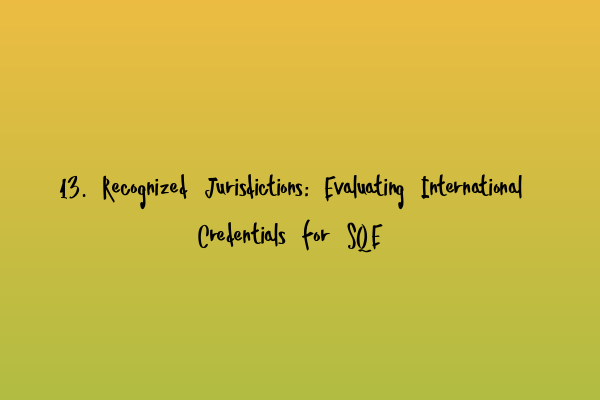Recognized Jurisdictions: Evaluating International Credentials for SQE
Aspiring solicitors preparing for the Solicitors Qualifying Exam (SQE) often come from diverse educational backgrounds and jurisdictions. If you have obtained your legal qualification from an international jurisdiction, it is essential to understand how your credentials will be evaluated for the SQE. In this article, we will guide you through the process of evaluating international credentials and provide you with valuable insights to ensure a smooth transition into the SQE.
The Importance of Recognized Jurisdictions
The Solicitors Regulation Authority (SRA) has established a list of recognized jurisdictions from which individuals can obtain exemptions from certain parts of the SQE. These jurisdictions are recognized because their legal education and training systems are deemed equivalent to the English system. If you have completed your legal qualification in one of these recognized jurisdictions, you may be eligible for exemptions from specific parts of the SQE.
To check if your jurisdiction is recognized, it is crucial to refer to the SRA’s official list of recognized jurisdictions. This list is regularly updated, so it is essential to stay up to date with any changes.
If your jurisdiction is not recognized, it does not necessarily mean that your legal qualification is not valid. It simply means that you may not be eligible for exemptions from the SQE, and you will need to complete the entire exam. However, you can still demonstrate the knowledge and skills required for the SQE by thoroughly preparing for the exam.
Evaluating International Credentials for SQE
When evaluating your international credentials for the SQE, there are several factors to consider:
1. Comparability of Education and Training
The first step is to assess the comparability of your international legal education and training with the English system. This involves evaluating the content, duration, and level of your legal qualification. It is important to note that the SRA evaluates each qualification on an individual basis, taking into account various factors such as curriculum, assessment methods, and academic standards.
To demonstrate the comparability of your education and training, you may be required to provide detailed information about your coursework, subjects studied, and assessment methods. It is advisable to gather all relevant documents and transcripts to support your application.
2. English Language Proficiency
Proficiency in the English language is a crucial requirement for the SQE. As an international candidate, you will need to demonstrate your language skills by providing evidence of English language proficiency. This may include providing proof of achieving a certain score in an approved English language test, such as the International English Language Testing System (IELTS).
It is important to note that the specific English language requirements may vary depending on your jurisdiction. Therefore, it is essential to carefully review the SRA’s guidelines and requirements.
3. Seeking Advice and Guidance
If you are unsure about the evaluation process or have any concerns regarding your international credentials, it is advisable to seek advice and guidance from experienced professionals. Consulting a solicitor or engaging with organizations that specialize in assisting international candidates with the SQE can provide invaluable insights and support.
Preparing for the SQE
Regardless of whether you are eligible for exemptions or need to complete the entire SQE, thorough preparation is key to success. Here are some additional resources to help you in your preparation:
- Conquer the Multiple Choice Questions (MCQ) in SQE1
- Interactive mock tests for SQE: Enhancing engagement and learning
- SQE Sample Papers: Practice for Exam Success
- Focus Areas in SQE1 and SQE2: Mastering Key Concepts
- Adjusting Your SQE Strategy Based on Mock Performance
These articles provide valuable insights, strategies, and resources to help you enhance your performance in the SQE. Interactive mock tests, sample papers, and focus areas will allow you to familiarize yourself with the exam format, identify areas for improvement, and tailor your study plan accordingly.
Remember, preparation is the key to success in the SQE. Utilize the available resources, seek guidance when needed, and stay determined on your path to becoming a qualified solicitor in England and Wales.
